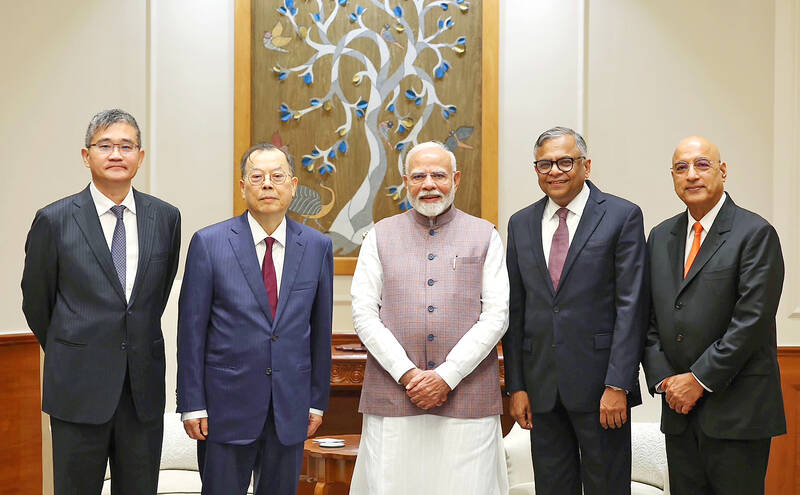Powerchip Semiconductor Manufacturing Corp (力積電) yesterday said that it signed an agreement with Tata Electronics Pvt Ltd to help build India’s first 12-inch chip manufacturing facility with a total investment of US$11 billion.
As part of the agreement, Powerchip would provide Tata with access to mature technology nodes and help to train Indian workers, the Taiwanese company said in a statement.
The fab would be located in Dholera, Gujarat. It would have a capacity of 50,000 wafers per month and create 20,000 jobs in the region, Powerchip said.

Photo courtesy of Powerchip Semiconductor Manufacturing Corp
Tata would receive access to a broad technology portfolio of leading-edge and mature nodes, including 28, 40, 55, 90 and 110-nanometer technologies, as well as collaboration in high-volume manufacturing.
The new fab is to manufacture chips for applications such as power management ICs, display driver ICs, microcontrollers and high-performance computing chips. These products are in high demand in the automotive, computing and data storage, wireless communications and artificial intelligence sectors, it said.
Powerchip told investors in July that any overseas technology partnerships would be based on the condition that they would generate new cash flow and have a positive impact on the company’s financial performance.
The news came after the US and India reached an agreement to work together on setting up a semiconductor fab in India, giving a boost to Indian Prime Minister Narendra Modi’s efforts to increase high-tech manufacturing in the country.
The proposed plant would make infrared, gallium nitride and silicon-carbide semiconductors, the White House said in a statement following a meeting between US President Joe Biden and Modi on Saturday last week.
Earlier this month, Indian Minister of Railways, Communications and Electronics and Information Technology Ashwini Vaishnaw said that the South Asian country is attempting to develop the entire chip value chain as India aims to increase its electronics sector to US$500 billion by the end of the decade.
Additional reporting by Bloomberg

Intel Corp chief executive officer Lip-Bu Tan (陳立武) is expected to meet with Taiwanese suppliers next month in conjunction with the opening of the Computex Taipei trade show, supply chain sources said on Monday. The visit, the first for Tan to Taiwan since assuming his new post last month, would be aimed at enhancing Intel’s ties with suppliers in Taiwan as he attempts to help turn around the struggling US chipmaker, the sources said. Tan is to hold a banquet to celebrate Intel’s 40-year presence in Taiwan before Computex opens on May 20 and invite dozens of Taiwanese suppliers to exchange views

Application-specific integrated circuit designer Faraday Technology Corp (智原) yesterday said that although revenue this quarter would decline 30 percent from last quarter, it retained its full-year forecast of revenue growth of 100 percent. The company attributed the quarterly drop to a slowdown in customers’ production of chips using Faraday’s advanced packaging technology. The company is still confident about its revenue growth this year, given its strong “design-win” — or the projects it won to help customers design their chips, Faraday president Steve Wang (王國雍) told an online earnings conference. “The design-win this year is better than we expected. We believe we will win

Chizuko Kimura has become the first female sushi chef in the world to win a Michelin star, fulfilling a promise she made to her dying husband to continue his legacy. The 54-year-old Japanese chef regained the Michelin star her late husband, Shunei Kimura, won three years ago for their Sushi Shunei restaurant in Paris. For Shunei Kimura, the star was a dream come true. However, the joy was short-lived. He died from cancer just three months later in June 2022. He was 65. The following year, the restaurant in the heart of Montmartre lost its star rating. Chizuko Kimura insisted that the new star is still down

While China’s leaders use their economic and political might to fight US President Donald Trump’s trade war “to the end,” its army of social media soldiers are embarking on a more humorous campaign online. Trump’s tariff blitz has seen Washington and Beijing impose eye-watering duties on imports from the other, fanning a standoff between the economic superpowers that has sparked global recession fears and sent markets into a tailspin. Trump says his policy is a response to years of being “ripped off” by other countries and aims to bring manufacturing to the US, forcing companies to employ US workers. However, China’s online warriors